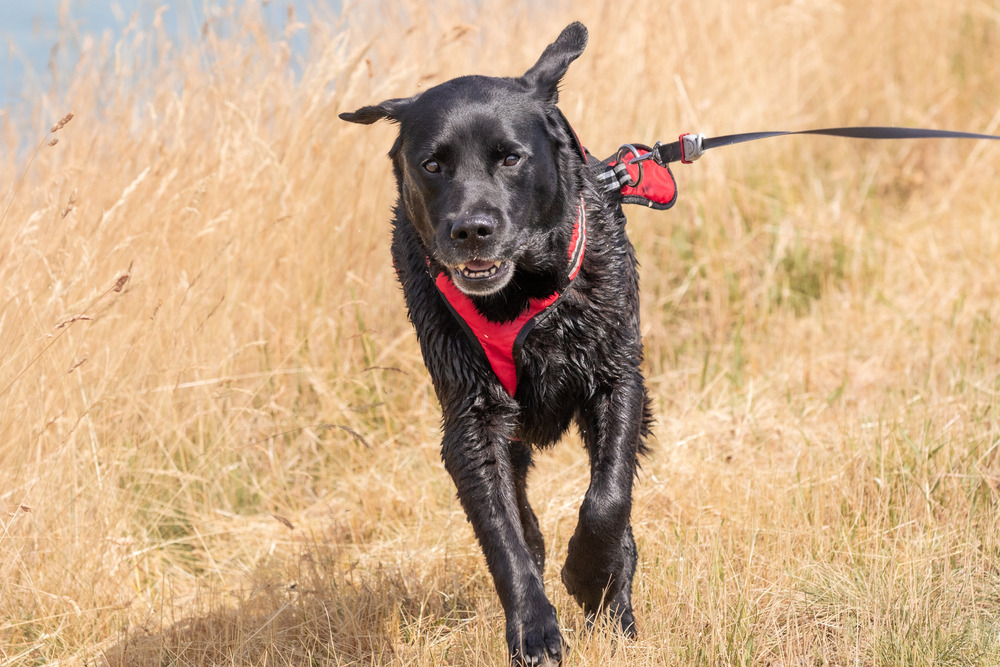The Labrador Retriever is one of the most common dogs in the United States. They have been extremely popular for many years, and most people have interacted with or owned a Labrador Retriever at some point. But how many people actually know a lot about the Labrador Retriever? There is a lot to know.
Labrador Retrievers are some of the most interesting dogs available right now, thanks to their versatility, history, and demeanor. The Labrador Retriever is not short of surprising and interesting facts. Here are ten surprising facts about Labrador Retrievers, ranging from the jobs they can do to the health issues that they face.

The 10 Facts About Labrador Retrievers
1. Labrador Retrievers Originate From Newfoundland, Canada
The Labrador Retriever hails from Newfoundland, Canada. Newfoundland was an ample breeding ground for hardy dog breeds. Newfoundland is also where the Newfoundland dog is from. In both cases, the Labrador Retriever and the Newfoundland were bred to be able to work and function in cold and wet climates. To eliminate any confusion between the Newfoundland dog and the Labrador Retriever, the latter was named after the nearby Labrador Sea rather than the territory of Labrador. Newfoundland dogs were bred to help fishermen on the docks and on boats, while the Labrador Retriever was bred to help Canadian hunters retrieve waterfowl from cold ponds, streams, and lakes.
From Newfoundland, the Labrador Retriever spread to England, then mainland Europe, before spreading south into the United States. Today, the Labrador Retriever is one of the most popular dog breeds in the United States and has routinely taken the top spot for the most popular dog that is tracked by the American Kennel Club.

2. Labrador Retrievers Were Bred as Dedicated Hunting Dogs
The Labrador Retriever was originally bred to retrieve ducks for bird hunters in the 19th century. When Labrador Retrievers made their way from Canada back to mainland Europe, they were trained as general hunting companions. During this time, Labrador Retrievers were trained to be general retrievers for waterfowl of all kinds as well as small game. Today, Labrador Retrievers can still function as excellent hunting companions. They have tons of energy, can be trained to do a variety of jobs, and can be out on the trail for hours without tiring or growing bored.
3. Today, Labs Are Versatile Working Dogs
Most people no longer use their Labrador Retriever as a dedicated hunting dog. In fact, since Labrador Retrievers have become so popular, the majority of them are no longer swimming out to retrieve ducks. But that doesn’t mean that the Labrador Retriever has stopped working. The Labrador Retriever’s large frame, endless energy reserves, and trainability make them excellent working dogs.
Labrador Retrievers now work as service dogs, search and rescue dogs, bomb sniffing dogs, drug detection dogs, and therapy dogs. Labrador Retrievers can be trained as water rescue dogs due to their ability to swim and their ability to withstand cold water temperatures. You might not see Labrador Retrievers working as police dogs, but hundreds of them are working numerous different jobs all over the world. They work with government agencies ranging from the Coast Guard to Border Patrol and the TSA.

4. Labrador Retrievers Love to Swim
Due to their background as duck retrievers, Labrador Retrievers love to swim. These dogs adore water and will not shy away from leaping into a pond or pool. Labrador Retrievers have waterproof coats and webbed feet, which make them adept swimmers. Since these dogs were bred in Canada and trained in Northern Europe, they will not shy away from water that is usually too cold for other dogs.
Not only is the Labrador Retriever’s coat water resistant, but it is also thick and warm, which allows them to splash through cold water better than most other dog breeds. These traits allow Labrador Retrievers to spend ample time in the water without slowing down. Even if you do not hunt ducks, your Labrador Retriever will still appreciate time in the pool during the summer or trips to the beach.
5. Labs Are Also Excellent Sporting Dogs
Labrador Retrievers also excel at a variety of dog sports. Labs can be trained to compete and win in numerous different dog trials. Labrador Retrievers are excellent at dock diving, hunting trials and tests, agility, rally, and obedience. The success of the Labrador Retriever in all of these different fields speaks to the versatility of the breed and its trainability. If you put your mind to it, you can train a Labrador Retriever to do almost any job, which cannot be said of most dog breeds. Between hunting, working and competing, there is not much that a well-trained Labrador Retriever cannot do.

6. Labrador Retrievers Come in Three Colors
Labrador Retrievers come in three distinct colors. Labrador Retrievers can be yellow, black, and chocolate. Sometimes, people refer to their Labrador Retriever by their color confirmation. You will hear names like “Yellow Lab”, “Chocolate Lab”, and “Black Lab”. These are simply Labrador Retrievers of each of these primary colors. Despite persistent rumors and myths, breeders are confident that color has no bearing on the personality or demeanor of your Labrador Retriever. All three colors of Labrador Retriever are typically shown during dog shows, and each color is allowed to compete in various competitions.
7. Labrador Retrievers Are Prone to Obesity and Diabetes
Labrador Retrievers love food, which makes them prone to both obesity and diabetes. In fact, obesity and diabetes are two of the most commonly reported health issues that present themselves in Labrador Retrievers. That means that you have to be very careful when feeding your Labrador Retriever. You have to pay attention to portion sizes, the type of food you are feeding to your Labrador Retriever, and their overall weight and energy levels.
Obesity and diabetes can progress into serious health conditions that will touch every facet of your Labrador Retriever’s life. Obesity makes doing daily activities harder and puts strain on the joints and muscles. Diabetes can progress to dangerous outcomes that will require diligent management. Since Labrador Retrievers are prone to these conditions, a Labrador Retriever owner needs to be aware of the risks and work to mitigate them while the dog is still young and healthy.

8. Labs Have Tons of Energy and Need Ample Playtime
Labrador Retrievers have a boatload of energy. In fact, they are one of the most energetic dog breeds around. This means that Labrador Retrievers need plenty of playtime to keep them focused. Many people forget to give their Labrador Retrievers proper activities to keep their energy levels in check.
Labrador Retrievers need to go on plenty of walks per week, have a number of safe toys, structured playtime, and trips outside to places like the beach or the dog park. Not doing these things can leave you with a wild dog that is often hyperactive and refuses to listen to basic commands. Since Labs are so common, many people forget that these are working dogs at heart and do best when they have plenty of physical and mental stimulation.
9. Labrador Retriever Puppies Need Obedience Training to Thrive
As discussed, Labrador Retrievers are highly energetic and are used to being active on a regular basis. This means that Labrador Retrievers can become unwieldy if they do not receive obedience training at a young age. A large Labrador Retriever with tons of energy and few manners can be a nightmare.
In order to thrive, Labrador Retrievers need to receive obedience training when they are young puppies. This will set them up for success in the long run. Labrador Retrievers with a solid foundation of obedience training will be able to branch out into a variety of other jobs and activities. It will also help to keep them calm and well-mannered when they are in public or around other people.

10. Labrador Retrievers Make Excellent First-Time Dogs
Due to their sociability, ease of training, affectionate demeanor, and openness to strangers, Labrador Retrievers make excellent first-time dogs. They’re very adaptable to your routine, eager to please, and get along extremely well with children, the elderly, and even other pets (such as cats).
They’re also not considered brachycephalic and therefore, they are spared of the respiratory health issues brachycephalic dog breeds are susceptible to. All of this is topped off with a very friendly grooming routine and schedule to keep their coat looking marvelous. They effectively tick just about every box when it comes to the desired traits in a first-time dog.

Conclusion
With all of these incredible facts about Labrador Retrievers, it is not surprising to learn that this breed is so popular. These dogs are highly versatile and can be trained to do almost any job you can think of. From humble beginnings as simple hunting dogs bred to retrieve ducks, to professional search and rescue dogs, to beloved family companions, the Labrador Retriever is one of the most interesting and enduring dog breeds in the world.
Featured Image Credit: Chiemsee2016, Pixabay



















